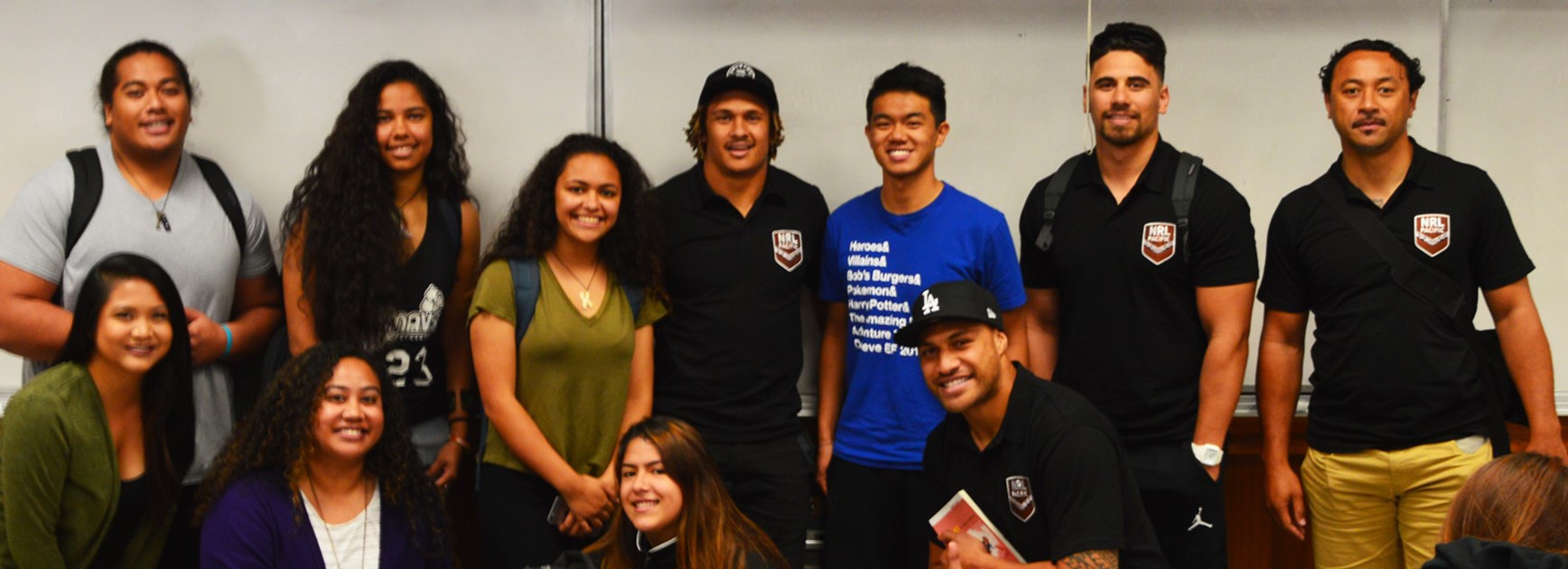
Four Indigenous and Pasifika NRL players who were awarded 2016 Leadership and Excellence Awards as part of the 2016 RLPA Academic Team of the year have returned from another eye-opening trip to the US.
Accompanied by NRL Education and Wellbeing Manager Nigel Vagana and Indigenous Welfare and Education Manager Dean Widders, Pasifika awardees Ben Henry and Sam Tagataese plus Indigenous recipients Ray Thompson and Dane Gagai stayed at the UCLA campus in LA and got a first-hand look at what student athletes in the US go through.
Vagana, who took Dene Halatau, Bronson Harrison, Joel Thompson and George Rose last year, told NRL.com the players were buzzing from the minute they got off the plane at LAX.
"It was about opening their eyes to new environments with the hope they come back and look at ways to help our communities and games down here a bit differently," Vagana said.
"The student athletes we spent time with at UCLA do school work and sport eight days a week; they have no time off. Little things like that hit home for the whole crew and challenged their thought processes a bit."
He said the players noticed similarities with Pasifika athletes in the US – down to their home lives and even the types of tattoos – but the college system is radically different.
"We went to a [college football] game at the Rose Bowl (a famous 92,500-seat NFL venue). The crowd numbers weren't as big as anticipated but it was still 65,000 so for our guys it was like 'what do you mean they're not happy with the crowd!'"
The players also got a chance to meet up with Souths co-owner Russell Crowe to get an understanding of his passion for the sport, and visited the infamous Skid Row precinct with its huge homeless population.
"Once all the shops and workers go at 5.30, it's like the whole homeless community come out with their tents and set it up and it goes for 30 blocks," Vagana said.
"To see the struggle of the communities over there and the divide in some places is really big. We stayed on campus as Westwood which is two streets over from Bel Air so just seeing the divide over there was pretty in your face."
Widders told NRL.com the cross-cultural activities had been the highlight of the trip.
"We did a lot of cross cultural stuff with the Pacific Islanders over there and also with the Native Americans," Widders said.
"It was good to see the athlete scholarship system at UCLA and how it works and the pressures that they're under over there.
"It was good for us to share a lot of stories about the NRL and the way our players see the game and the way these guys see the connection with the community compared to in America where they don't really connect with the community in their professional sports.
"For our guys they were really proud of that. We give opportunities to people from disadvantaged areas. Our players, no matter how far they make it, they're still connected to their communities and their culture.
"Speaking to people in America it was a shock that professional sports are still driven towards that. It makes you proud of rugby league that our game's driven around those values.
"The players also got the chance to lead a training session for a local rugby club to impart some rugby league skills in a part of the world where rugby league is still relatively unknown but growing.
"It was a real hit. We got 40 or 50 kids turn up to it," Widders said.
"All the kids went home and Googled rugby league and NRL. The game's growing over there because Americans love the fact their kid does everything when they go and play rugby... They love it because the kid can pass and run and tackle and be involved in the whole game rather than just going there and playing a small part."
The size and scale of professional sport in the US and particularly NFL means players are treated more like a production line and don't necessarily get the same level of personal support available in the NRL, he added.
"They've got so many numbers piling up to be in these teams they don't really worry about well-being because if you're not ok now, we'll get the blokes who are, it's like a conveyor belt," he said.
"If this model's not right there's another 20 right behind it ready to come through. That's the mentality they've got with their sports. That's what I've found anyway."
